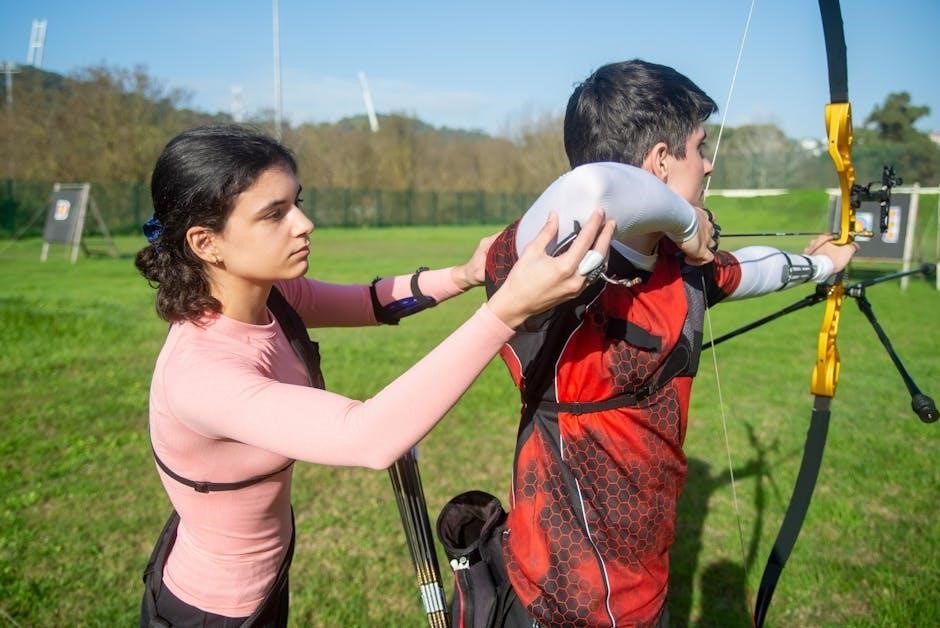History and Background of Instructional Coaches Day
Instructional Coaches Day is a celebration honoring educators who support teachers in improving instructional practices․ Originating from the growing recognition of coaching in education, it highlights the impact of instructional coaches on student and teacher success․

Role and Responsibilities of Instructional Coaches
Instructional coaches play a pivotal role in enhancing teacher effectiveness and student outcomes․ Their primary responsibility is to support educators in improving instructional practices through professional development, modeling lessons, and providing constructive feedback․ Coaches collaborate with teachers to identify areas for growth, develop strategies, and implement evidence-based teaching methods․ They also facilitate peer observation and reflective practices, fostering a culture of continuous improvement․ Additionally, instructional coaches often assist in curriculum design, data analysis, and technology integration to align teaching practices with educational goals․ Their work is centered on empowering teachers to create engaging and effective learning environments, ultimately benefiting both students and the educational community․

Celebration Ideas for Instructional Coaches Day
Celebrate instructional coaches with personalized gifts, appreciation events, or recognition ceremonies․ Acknowledge their dedication through digital shoutouts, customized cards, or a special tribute during school gatherings to honor their impact on education․
3․1․ Organizing Appreciation Events

Organizing appreciation events for Instructional Coaches Day is a meaningful way to honor their dedication․ Start by forming a planning committee to ensure diverse ideas and smooth execution․ Choose a theme that reflects the coaches’ impact, such as “Empowering Educators” or “Celebrating Growth․” Consider hosting a breakfast, luncheon, or afternoon gathering with personalized invitations․ Invite teachers, students, and administrators to share testimonials or write heartfelt notes․ Decorate the venue with banners, posters, or a memory wall highlighting coaches’ contributions․ Include interactive activities like a slideshow, trivia game, or raffle to keep the atmosphere engaging․ A keynote speaker or motivational video can inspire and recognize the coaches’ hard work․ End the event with a group photo or personalized certificates of appreciation․ Ensure the event is inclusive, reflecting the diverse roles and efforts of instructional coaches․ The goal is to create a memorable experience that truly celebrates their influence on education․
3․2․ Personalized Gifts and Tokens of Appreciation
Personalized gifts and tokens of appreciation are thoughtful ways to honor instructional coaches․ Consider customizing items like mugs, notebooks, or tote bags with their names or a heartfelt message․ Engraved plaques or framed certificates of appreciation can serve as lasting reminders of their impact․ Another idea is to create a personalized photo album or scrapbook filled with memories of their work with teachers and students․ Tech-related gifts, such as a wireless charging pad or a high-quality pair of noise-canceling headphones, can also be practical and meaningful․ Additionally, a handwritten letter or a heartfelt card signed by the entire school community can be deeply touching․ These gestures show that their dedication and hard work are truly valued․ Personalized gifts not only celebrate their contributions but also strengthen the bond between instructional coaches and the educators they support․

Professional Development for Instructional Coaches
Professional development is essential for instructional coaches to enhance their skills and stay updated on best practices․ Workshops, webinars, and conferences provide platforms for coaches to learn about innovative teaching strategies, classroom management techniques, and data-driven instruction․ Many organizations offer certifications and training programs tailored to instructional coaching, focusing on areas like curriculum design, technology integration, and leadership development․ Coaches can also benefit from peer mentoring and collaborative learning communities, where they share experiences and refine their coaching methods․ Additionally, engaging with educational research and literature helps coaches align their practices with evidence-based approaches․ Continuous professional growth ensures that instructional coaches can effectively support teachers in improving student outcomes․ By prioritizing their own learning, coaches become more impactful in their roles, fostering a culture of continuous improvement in education․
Tools and Resources for Instructional Coaches
Instructional coaches utilize a variety of tools and resources to effectively support teachers and enhance classroom practices․ Digital platforms like Google Classroom and Zoom facilitate virtual coaching sessions and collaborative planning․ Lesson planning tools such as Edmodo and Trello help organize and share instructional materials․ Assessment tools like Kahoot and Quizlet enable coaches to gauge student understanding and track progress․ Data analytics tools, such as Google Analytics, assist in measuring the impact of coaching strategies․ Additionally, coaches rely on professional development resources like The Instructional Coaching Group and EdSurge for latest trends and research․ Books such as “The Coaching Habit” by Michael Bungay Stanier provide practical frameworks for effective coaching․ Webinars, online courses, and workshops offered by organizations like ASCD further enhance their skill sets․ These tools and resources empower instructional coaches to deliver targeted support, fostering a culture of continuous improvement in education․
Measuring the Impact of Instructional Coaches

Evaluating the impact of instructional coaches is essential to understand their contribution to educational success․ Surveys and feedback from teachers provide insights into perceived effectiveness․ Observations of coaching sessions help assess the quality of interactions and strategies used․ Student performance data, such as test scores and progress metrics, are analyzed to link coaching efforts to learner outcomes․ Tools like Google Analytics and specialized education platforms track engagement and progress․ Regular reflection and self-assessment by coaches themselves also play a role․ The goal is to identify strengths and areas for improvement, ensuring coaching practices remain aligned with school objectives․ By combining quantitative and qualitative measures, schools can comprehensively evaluate the influence of instructional coaches and refine their support systems for optimal results․

Success Stories and Case Studies
Success stories and case studies highlight the transformative impact of instructional coaches on education․ Many schools have reported improved teaching strategies and enhanced student outcomes due to coaching․ For example, a case study in an elementary school showed a 20% increase in reading proficiency after implementing coaching․ Teachers credited the personalized support and collaborative planning for their improved instructional practices․ Another success story involved a high school where instructional coaches focused on STEM subjects, leading to higher student engagement and better performance in state exams․ These examples demonstrate how instructional coaches empower educators and foster academic growth․ By sharing such stories, educators and administrators can gain insights into effective coaching practices․ These case studies also underscore the importance of recognizing and celebrating the vital role of instructional coaches in shaping educational success․
Future Trends in Instructional Coaching

Future trends in instructional coaching point to a more technologically integrated and data-driven approach․ Coaches will likely leverage AI tools to analyze teaching practices and provide personalized feedback․ There will also be a greater emphasis on equity and inclusion, ensuring all teachers and students receive tailored support; Virtual coaching platforms will become more prevalent, allowing for remote collaboration and resource sharing․ Additionally, coaches may focus on fostering teacher well-being and resilience, recognizing the emotional demands of education․ Professional development will increasingly incorporate micro-credentials and competency-based learning, enabling coaches to specialize in niche areas․ The role of instructional coaches will expand to include mentoring new educators and leading school-wide initiatives․ These trends reflect a growing recognition of the critical role coaches play in shaping educational excellence and innovation․

Instructional Coaches Day serves as a vital opportunity to recognize the dedication and impact of instructional coaches in education․ These professionals play a pivotal role in enhancing teaching practices, fostering teacher growth, and ultimately improving student outcomes․ As the field of instructional coaching continues to evolve, its importance in shaping educational excellence cannot be overstated․ By celebrating these coaches, we not only honor their contributions but also underscore the transformative power of collaborative learning and professional development․ Moving forward, the role of instructional coaches will remain integral to fostering innovation and equity in education․ Their work ensures that educators are equipped with the skills and resources needed to meet the diverse needs of students․ Let us continue to appreciate and support instructional coaches as they strive to create a brighter future for education․
